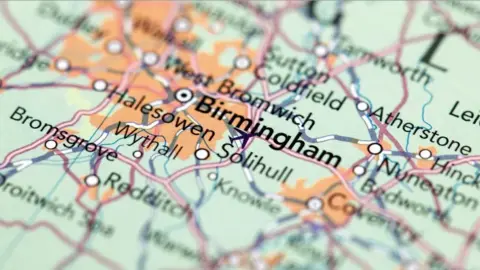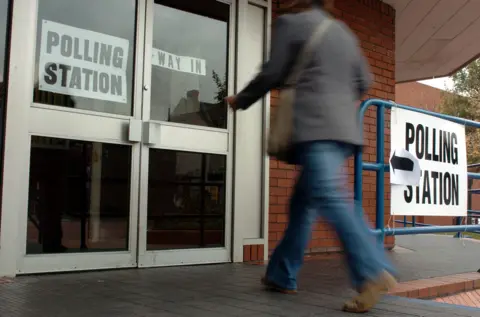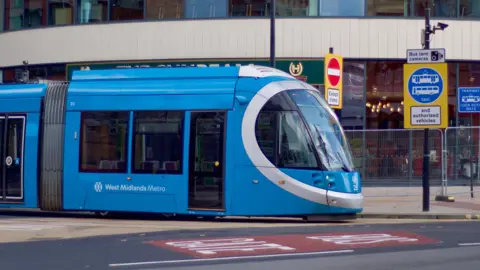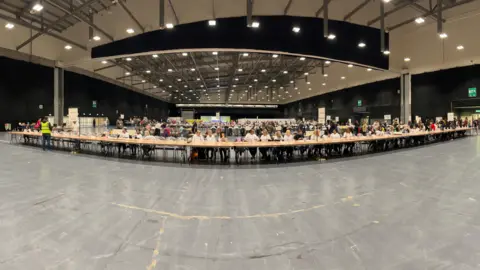West Midlands mayor: Who is running, what is the role?
 Getty Images
Getty ImagesThe next West Midlands mayor will be elected in spring 2024.
Residents of seven council areas represented by the mayor will vote on 2 May.
The post was created in 2017 as a condition of the government giving additional powers and funding to the region's local authorities.
The incumbent is to act as a figurehead and champion for the area, lobbying government for support.

Who can vote in the election?
The Mayor represents about 2.8 million people in:
- Birmingham
- Coventry
- Dudley
- Sandwell
- Solihull
- Walsall
- Wolverhampton
If you are registered to vote, and live in one of these council areas, you will be able to participate in the election.
These council areas form a wider body called the West Midlands Combined Authority (WMCA), the organisation created to take on additional funding and powers from central Government. The mayor is effectively the publicly elected chairman of this grouping.
Are other areas involved?
There are some council areas which are classed as “non-constituent” members of the WMCA. These authorities are consulted on decisions, but have no formal voting rights. Residents living there cannot vote in the West Midlands mayoral election.
These areas include: Shropshire, Cannock, Redditch, Tamworth, and Telford and Wrekin.

What powers does the mayor have?
One of the most tangible parts of the mayor's powers is transport and how people travel across the region.
Among the large projects the office and the WMCA have paid for in recent months were the ongoing tram extensions in the region, including Wednesbury to Brierley Hill.
New railway services and stations have also been proposed while the authority has plans for electric buses, very light railway schemes and getting more of us cycling and walking.
There is a large amount of money at stake already in the region, with the WMCA having set a budget of £1.2bn for 2024-25.
Other areas the mayor has the power to take action on include housing, economic growth in the region and cultural schemes.
What they are not responsible for are things local councils handle such as providing social care, weekly bin collections, parks and libraries.
Plans to merge the mayor's office with that of the West Midlands force area's Police and Crime Commissioner have been blocked, following a court ruling.
Who is standing to become Mayor?
Here are the candidates listed in alphabetic order by surname:
The Green Party's candidate will be Siobhan Harper-Nunes, who has worked in the public sector and with charitable organisations, including the Institute of Social Enterprise and National Council of Voluntary Organisations.
The Labour Party has selected Richard Parker - a former partner at accountancy firm PricewaterhouseCoopers.
The Conservative Party candidate is Andy Street - the incumbent West Midlands mayor. The former John Lewis chief executive has held the post ever since the first election in 2017, successfully defending his position at the subsequent election in 2021.
Sunny Virk has been named the Liberal Democrats' candidate. He is a barrister and mediator from the West Midlands, who also stood for the party in the 2023 Tamworth by-election.
For Reform UK, the party has selected Elaine Williams as its candidate to contest May's election.
Akhmed Yakoob is standing as an independent candidate.

When will we find out who has won?
The election will take place on 2 May but the count will not start until a couple of days later, meaning we will not find out who has won until about 16:00 BST on 4 May.
In addition, the mayoral election will be a little different this time.
- Local elections 2024: When and where are they, and who can vote?
- Is there an election in my area?
- What photo ID do you need to vote in local elections?
- What can't I do in a polling station?
Previous ones used the supplementary vote system. In 2024, the election will use the “first past the post” system which people are used to seeing in council and general elections.
It simply means the person with the most votes at the end of the count wins.
The deadlines to register to vote in the May elections in England and Wales, or to request a postal vote, have passed.
If you are already registered, the deadline to apply for a proxy vote is 17:00 BST on Wednesday 24 April.
The rules about voting by proxy have changed. If you applied for a proxy vote before 31 October 2023, it is no longer valid, and you must apply for a new one.
Follow BBC West Midlands on Facebook, X and Instagram. Send your story ideas to: [email protected]
